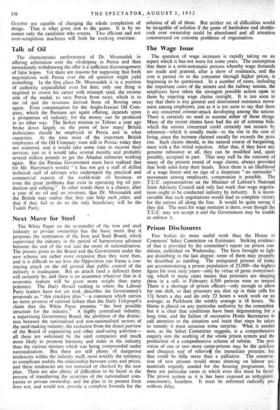Talk of Oil
The characteristic performance of Dr. Moussadek in offering arbitration over the oil-dispute in Persia and then immediately withdrawing the offer is a sufficient discouragement of false hopes. Yet there are reasons for supposing that fresh negotiations with Persia over the oil question might yield something. In the first place Dr. Moussadek is in a position of authority unparalleled even for him; only one thing is required to crown his career with triumph (and, the reverse side of the medal, to save Persia from ruin), which is to see oil and the revenues derived from oil flowing once again. Even compensation for the Anglo-Iranian Oil Com- pany, which the Persians are again offering, depends upon a prosperous oil industry, for the money can be produced in no other way. The Stokes mission to Tehran a year ago broke down largely on the point of how many British technicians should be employed in Persia and in what capacities. At the time most of the important British employees of the Oil Company were still in Persia; today they are scattered, and it would take some time to recover their services, just as it would take several months and probably several million pounds to get the Abadan refineries working again. But the Persian Government must have realised that (in Mr. Harriman's words) " it has not got a staff of skilled technical staff of advisers who understand the practical and commercial aspects of the world-wide oil business, or even the great problems that exist in operating big oil pro- duction and refining." In other words there is a chance, after a year of no oil and no revenues, ttiat Dr. Moussadek and the British may realise that they can help each .other, and that if they fail to do so the only beneficiary will be the Tudeh Party.


























 Previous page
Previous page